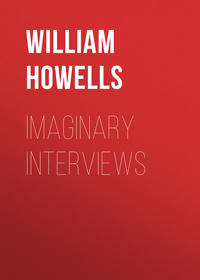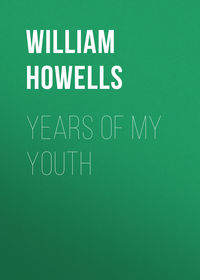 полная версия
полная версияThe Daughter of the Storage
"What an idea, mother!" Charlotte said, grouping the several impossibilities under one head in her answer.
"You had a perfect right to know, if you thought he was the one."
"But I didn't think he was the one, and I don't know that he is now; and if he was, what could I do about it?"
"That is true," Mrs. Forsyth owned. "But it's very disappointing. I've always felt as if they ought to know it was your undecidedness and not ungenerousness."
Charlotte laughed a little forlornly, but she only said, "Really, mother!"
Mrs. Forsyth was still looking at the curtains. "Well, these are not the scrims I wanted. You must go back. I believe I will go with you. The sooner we have it over the better," she added, and she left the undecided Charlotte to decide whether she meant the scrim curtains or the young man's identity.
It was very well, for one reason, that she decided to go with Charlotte that afternoon. The New-Yorkers must have completed the inspection of their trunks, for they had not come back. Their failure to do so was the more important because the young man had come back and was actively superintending the unpacking of his room. The palatial furniture had all been ranged up and down the corridor, and as fast as a trunk was got out and unlocked he went through it with the help of the storage-men, listed its contents in a note-book with a number, and then transferred the number and a synopsis of the record to a tag and fastened it to the trunk, which he had put back into the room.
When the Forsyths arrived with the mistaken scrim curtains, he interrupted himself with apologies for possibly being in their way; and when Mrs. Forsyth said he was not at all in their way, he got white-and-gold arm-chairs for her and Charlotte and put them so conveniently near the old ancestral room that Mrs. Forsyth scarcely needed to move hand or foot in letting Charlotte restore the wrong curtains and search the chests for the right ones. His politeness made way for conversation and for the almost instant exchange of confidences between himself and Mrs. Forsyth, so that Charlotte was free to enjoy the silence to which they left her in her labors.
"Before I say a word," Mrs. Forsyth said, after saying some hundreds in their mutual inculpation and exculpation, "I want to ask something, and I hope you will excuse it to an old woman's curiosity and not think it rude."
At the words "old woman's" the young man gave a protesting "Oh!" and at the word "rude" he said, "Not at all."
"It is simply this: how long have your things been here? I ask because we've had this room thirteen or fourteen years, and I've never seen your room opened in that whole time."
The young man laughed joyously. "Because it hasn't been opened in that whole time. I was a little chap of three or four bothering round here when my mother put the things in; I believe it was a great frolic for me, but I'm afraid it wasn't for her. I've been told that my activities contributed to the confusion of the things and the things in them that she's been in ever since, and I'm here now to make what reparation I can by listing them."
"She'll find it a great blessing," Mrs. Forsyth said. "I wish we had ours listed. I suppose you remember it all very vividly. It must have been a great occasion for you seeing the things stored at that age."
The young man beamed upon her. "Not so great as now, I'm afraid. The fact is, I don't remember anything about it. But I've been told that I embarrassed with my personal riches a little girl who was looking over her doll's things."
"Oh, indeed!" Mrs. Forsyth said, stiffly, and she turned rather snubbingly from him and said, coldly, to Charlotte: "I think they are in that green trunk. Have you the key?" and, stooping as her daughter stooped, she whispered, "Really!" in condemnation and contempt.
Charlotte showed no signs of sharing either, and Mrs. Forsyth could not very well manage them alone. So when Charlotte said, "No, I haven't the key, mother," and the young man burst in with, "Oh, do let me try my master-key; it will unlock anything that isn't a Yale," Mrs. Forsyth sank back enthroned and the trunk was thrown open.
She then forgot what she had wanted it opened for. Charlotte said, "They're not here, mother," and her mother said, "No, I didn't suppose they were," and began to ask the young man about his mother. It appeared that his father had died twelve years before, and since then his mother and he had been nearly everywhere except at home, though mostly in England; now they had come home to see where they should go next or whether they should stay.
"That would never suit my daughter," Mrs. Forsyth lugged in, partly because the talk had gone on away from her family as long as she could endure, and partly because Charlotte's indecision always amused her. "She can't bear to choose."
"Really?" the young man said. "I don't know whether I like it or not, but I have had to do a lot of it. You mustn't think, though, that I chose this magnificent furniture. My father bought an Italian palace once, and as we couldn't live in it or move it we brought the furniture here."
"It is magnificent," Mrs. Forsyth said, looking down the long stretches of it and eying and fingering her specific throne. "I wish my husband could see it – I don't believe he remembers it from fourteen years ago. It looks – excuse me! – very studio."
"Is he a painter? Not Mr. Forsyth the painter?"
"Yes," Mrs. Forsyth eagerly admitted, but wondering how he should know her name, without reflecting that a score of trunk-tags proclaimed it and that she had acquired his by like means.
"I like his things so much," he said. "I thought his three portraits were the best things in the Salon last year."
"Oh, you saw them?" Mrs. Forsyth laughed with pleasure and pride. "Then," as if it necessarily followed, "you must come to us some Sunday afternoon. You'll find a number of his new portraits and some of the subjects; they like to see themselves framed." She tried for a card in her hand-bag, but she had none, and she said, "Have you one of my cards, my dear?" Charlotte had, and rendered it up with a severity lost upon her for the moment. She held it toward him. "It's Mr. Peter Bream?" she smiled upon him, and he beamed back.
"Did you remember it from our first meeting?"
In their cab Mrs. Forsyth said, "I don't know whether he's what you call rather fresh or not, Charlotte, and I'm not sure that I've been very wise. But he is so nice, and he looked so glad to be asked."
Charlotte did not reply at once, and her silent severity came to the surface of her mother's consciousness so painfully that it was rather a relief to have her explode, "Mother, I will thank you not to discuss my temperament with people."
She gave Mrs. Forsyth her chance, and her mother was so happy in being able to say, "I won't – your temper, my dear," that she could add with sincere apology: "I'm sorry I vexed you, and I won't do it again."
IV
The next day was Sunday; Peter Bream took it for some Sunday, and came to the tea on Mrs. Forsyth's generalized invitation. She pulled her mouth down and her eyebrows up when his card was brought in, but as he followed hard she made a lightning change to a smile and gave him a hand of cordial welcome. Charlotte had no choice but to welcome him, too, and so the matter was simple for her. She was pouring, as usual, for her mother, who liked to eliminate herself from set duties and walk round among the actual portraits in fact and in frame and talk about them to the potential portraits. Peter, qualified by long sojourn in England, at once pressed himself into the service of handing about the curate's assistant; Mrs. Forsyth electrically explained that it was one of the first brought to New York, and that she had got it at the Stores in London fifteen years before, and it had often been in the old ancestral room, and was there on top of the trunks that first day. She did not recur to the famous instance of Charlotte's infant indecision, and Peter was safe from a snub when he sat down by the girl's side and began to make her laugh. At the end, when her mother asked Charlotte what they had been laughing about, she could not tell; she said she did not know they were laughing.
The next morning Mrs. Forsyth was paying for her Sunday tea with a Monday headache, and more things must be got out for the country. Charlotte had again no choice but to go alone to the storage, and yet again no choice but to be pleasant to Peter when she found him next door listing the contents of his mother's trunks and tagging them as before. He dropped his work and wanted to help her. Suddenly they seemed strangely well acquainted, and he pretended to be asked which pieces she should put aside as goods selected, and chose them for her. She hinted that he was shirking his own work; he said it was an all-summer's job, but he knew her mother was in a hurry. He found the little old trunk of her playthings, and got it down and opened it and took out some toys as goods selected. She made him put them back, but first he catalogued everything in it and synopsized the list on a tag and tagged the trunk. He begged for a broken doll which he had not listed, and Charlotte had so much of her original childish difficulty in parting with that instead of something else that she refused it.
It came lunch-time, and he invited her to go out to lunch with him; and when she declined with dignity he argued that if they went to the Woman's Exchange she would be properly chaperoned by the genius of the place; besides, it was the only place in town where you got real strawberry shortcake. She was ashamed of liking it all; he besought her to let him carry her hand-bag for her, and, as he already had it, she could not prevent him; she did not know, really, how far she might successfully forbid him in anything. At the street door of the apartment-house they found her mother getting out of a cab, and she asked Peter in to lunch; so that Charlotte might as well have lunched with him at the Woman's Exchange.
At all storage warehouses there is a season in autumn when the corridors are heaped with the incoming furniture of people who have decided that they cannot pass another winter in New York and are breaking up housekeeping to go abroad indefinitely. But in the spring, when the Constitutional Safe-Deposit offered ample space for thoughtful research, the meetings of Charlotte and Peter could recur without more consciousness of the advance they were making toward the fated issue than in so many encounters at tea or luncheon or dinner. Mrs. Forsyth was insisting on rather a drastic overhauling of her storage that year. Some of the things, by her command, were shifted to and fro between the more modern rooms and the old ancestral room, and Charlotte had to verify the removals. In deciding upon goods selected for the country she had the help of Peter, and she helped him by interposing some useful hesitations in the case of things he had put aside from his mother's possessions to be sold for her by the warehouse people.
One day he came late and told Charlotte that his mother had suddenly taken her passage for England, and they were sailing the next morning. He said, as if it logically followed, that he had been in love with her from that earliest time when she would not give him the least of her possessions, and now he asked her if she would not promise him the greatest. She did not like what she felt "rehearsed" in his proposal; it was not her idea of a proposal, which ought to be spontaneous and unpremeditated in terms; at the same time, she resented his precipitation, which she could not deny was inevitable.
She perceived that they were sitting side by side on two of those white-and-gold thrones, and she summoned an indignation with the absurdity in refusing him. She rose and said that she must go; that she must be going; that it was quite time for her to go; and she would not let him follow her to the elevator, as he made some offer of doing, but left him standing among his palatial furniture like a prince in exile.
By the time she reached home she had been able to decide that she must tell her mother at once. Her mother received the fact of Peter's proposal with such transport that she did not realize the fact of Charlotte's refusal. When this was connoted to her she could scarcely keep her temper within the bounds of maternal tenderness. She said she would have nothing more to do with such a girl; that there was but one such pearl as Peter in the universe, and for Charlotte to throw him away like that! Was it because she could not decide? Well, it appeared that she could decide wrong quickly enough when it came to the point. Would she leave it now to her mother?
That Charlotte would not do, but what she did do was to write a letter to Peter taking him back as much as rested with her; but delaying so long in posting it, when it was written, that it reached him among the letters sent on board and supplementarily delivered by his room steward after all the others when the ship had sailed. The best Peter could do in response was a jubilant Marconigram of unequaled cost and comprehensiveness.
His mother had meant to return in the fall, after her custom, to find out whether she wished to spend the winter in New York or not. Before the date for her sailing she fell sick, and Peter came sadly home alone in the spring. Mrs. Bream's death brought Mrs. Forsyth a vain regret; she was sorry now that she had seen so little of Mrs. Bream; Peter's affection for her was beautiful and spoke worlds for both of them; and they, the Forsyths, must do what they could to comfort him.
Charlotte felt the pathos of his case peculiarly when she went to make provision for goods selected for the summer from the old ancestral room, and found him forlorn among his white-and-gold furniture next door. He complained that he had no association with it except the touching fact of his mother's helplessness with it, which he had now inherited. The contents of the trunks were even less intimately of his experience; he had performed a filial duty in listing their contents, which long antedated him, and consisted mostly of palatial bric-à-brac and the varied spoils of travel.
He cheered up, however, in proposing to her that they should buy a Castle in Spain and put them into it. The fancy pleased her, but visibly she shrank from a step which it involved, so that he was, as it were, forced to say, half jokingly, half ruefully, "I can imagine your not caring for this rubbish or what became of it, Charlotte, but what about the owner?"
"The owner?" she asked, as it were somnambulantly.
"Yes. Marrying him, say, sometime soon."
"Oh, Peter, I couldn't."
"Couldn't? You know that's not playing the game exactly."
"Yes; but not – not right away?"
"Well, I don't know much about it in my own case, but isn't it usual to fix some approximate date? When should you think?"
"Oh, Peter, I can't think."
"Will you let me fix it? I must go West and sell out and pull up, you know, preparatory to never going again. We can fix the day now or we can fix it when I come back."
"Oh, when you come back," she entreated so eagerly that Peter said:
"Charlotte, let me ask you one thing. Were you ever sorry you wrote me that taking-back letter?"
"Why, Peter, you know how I am. When I have decided something I have undecided it. That's all."
From gay he turned to grave. "I ought to have thought. I haven't been fair; I haven't played the game. I ought to have given you another chance; and I haven't, have I?"
"Why, I suppose a girl can always change," Charlotte said, suggestively.
"Yes, but you won't always be a girl. I've never asked you if you wanted to change. I ask you now. Do you?"
"How can I tell? Hadn't we better let it go as it is? Only not hurry about – about – marrying?"
"Certainly not hurry about marrying. I've wondered that a girl could make up her mind to marry any given man. Haven't you ever wished that you had not made up your mind about me?"
"Hundreds of times. But I don't know that I meant anything by it."
He took her hand from where it lay in her lap as again she sat on one of the white-and-gold thrones beside him and gently pressed it. "Well, then, let's play we have never been engaged. I'm going West to-night to settle things up for good, and I won't be back for three or four months, and when I come back we'll start new. I'll ask you, and you shall say yes or no just as if you had never said either before."
"Peter, when you talk like that!" She saw his brown, round face dimly through her wet eyes, and she wanted to hug him for pity of him and pride in him, but she could not decide to do it. They went out to lunch at the Woman's Exchange, and the only regret Peter had was that it was so long past the season of strawberry shortcake, and that Charlotte seemed neither to talk nor to listen; she ought to have done one or the other.
They had left the Vaneckens busy with their summer trunks at the far end of the northward corridor, where their wireless station had been re-established for Charlotte's advantage, though she had not thought of it the whole short morning long. When she came back from lunch the Vaneckens were just brushing away the crumbs of theirs, which the son and brother seemed to have brought in for them in a paper box; at any rate, he was now there, making believe to help them.
Mrs. Forsyth had promised to come, but she came so late in the afternoon that she owned she had been grudgingly admitted at the office, and she was rather indignant about it. By this time, without having been West for three months, Peter had asked a question which had apparently never been asked before, and Charlotte had as newly answered it. "And now, mother," she said, while Mrs. Forsyth passed from indignant to exultant, "I want to be married right away, before Peter changes his mind about taking me West with him. Let us go home at once. You always said I should have a home wedding."
"What a ridiculous idea!" Mrs. Forsyth said, more to gain time than anything else. She added, "Everything is at sixes and sevens in the flat. There wouldn't be standing-room." A sudden thought flashed upon her, which, because it was sudden and in keeping with her character, she put into tentative words. "You're more at home here than anywhere else. You were almost born here. You've played about here ever since you were a child. You first met Peter here. He proposed to you here, and you rejected him here. He's proposed here again, and you've accepted him, you say – "
"Mother!" Charlotte broke in terribly upon her. "Are you suggesting that I should be married in a storage warehouse? Well, I haven't fallen quite so low as that yet. If I can't have a home wedding, I will have a church wedding, and I will wait till doomsday for it if necessary."
"I don't know about doomsday," Mrs. Forsyth said, "but as far as to-day is concerned, it's too late for a church wedding. Peter, isn't there something about canonical hours? And isn't it past them?"
"That's in the Episcopal Church," Peter said, and then he asked, very politely, "Will you excuse me for a moment?" and walked away as if he had an idea. It was apparently to join the Vaneckens, who stood in a group at the end of their corridor, watching the restoration of the trunks which they had been working over the whole day. He came back with Mr. Vanecken and Mr. Vanecken's mother. He was smiling radiantly, and they amusedly.
"It's all right," he explained. "Mr. Vanecken is a Presbyterian minister, and he will marry us now."
"But not here!" Charlotte cried, feeling herself weaken.
"No, certainly not," the dominie reassured her. "I know a church in the next block that I can borrow for the occasion. But what about the license?"
It was in the day before the parties must both make application in person, and Peter took a paper from his breast pocket. "I thought it might be needed, sometime, and I got it on the way up, this morning."
"Oh, how thoughtful of you, Peter!" Mrs. Forsyth moaned in admiration otherwise inexpressible, and the rest laughed, even Charlotte, who laughed hysterically. At the end of the corridor they met the Misses Vanecken waiting for them, unobtrusively expectant, and they all went down in the elevator together. Just as they were leaving the building, which had the air of hurrying them out, Mrs. Forsyth had an inspiration. "Good heavens!" she exclaimed, and then, in deference to Mr. Vanecken, said, "Good gracious, I mean. My husband! Peter, go right into the office and telephone Mr. Forsyth."
"Perhaps," Mr. Vanecken said, "I had better go and see about having my friend's church opened, in the meanwhile, and – "
"By all means!" Mrs. Forsyth said from her mood of universal approbation.
But Mr. Vanecken came back looking rather queer and crestfallen. "I find my friend has gone into the country for a few days; and I don't quite like to get the sexton to open the church without his authority, and – But New York is full of churches, and we can easily find another, with a little delay, if – "
He looked at Peter, who looked at Charlotte, who burst out with unprecedented determination. "No, we can't wait. I shall never marry Peter if we do. Mother, you are right. But must it be in the old ancestral five-dollar room?"
They all laughed except Charlotte, who was more like crying.
"Certainly not," Mr. Vanecken said. "I've no doubt the manager – "
He never seemed to end his sentences, and he now left this one broken off while he penetrated the railing which fenced in the manager alone among a group of vacated desks, frowning impatient. At some murmured words from the dominie, he shouted, "What!" and then came out radiantly smiling, and saying, "Why, certainly." He knew all the group as old storers in the Constitutional, and called them each by name as he shook them each by the hand. "Everything else has happened here, and I don't see why this shouldn't. Come right into the reception-room."
With some paintings of biblical subjects, unclaimed from the storage, on the walls, the place had a religious effect, and the manager significantly looked out of it a lingering stenographer, who was standing before a glass with two hatpins crossed in her mouth preparatory to thrusting them through the straw. She withdrew, visibly curious and reluctant, and then the manager offered to withdraw himself.
"No," Charlotte said, surprisingly initiative in these junctures, "I don't know how it is in Mr. Vanecken's church, but, if father doesn't come, perhaps you'll have to give me away. At any rate, you're an old friend of the family, and I should be hurt if you didn't stay."
She laid her hand on the manager's arm, and just as he had protestingly and politely consented, her father arrived in a taxicab, rather grumbling from having been obliged to cut short a sitting. When it was all over, and the Vaneckens were eliminated, when, in fact, the Breams had joined the Forsyths at a wedding dinner which the bride's father had given them at Delmonico's and had precipitated themselves into a train for Niagara ("So banal," Mrs. Forsyth said, "but I suppose they had to go somewhere, and we went to Niagara, come to think of it, and it's on their way West"), the bride's mother remained up late talking it all over. She took credit to herself for the whole affair, and gave herself a great deal of just praise. But when she said, "I do believe, if it hadn't been for me, at the last, Charlotte would never have made up her mind," Forsyth demurred.
"I should say Peter had a good deal to do with making up her mind for her."
"Yes, you might say that."
"And for once in her life Charlotte seems to have had her mind ready for making up."
"Yes, you might say that, too. I believe she is going to turn out a decided character, after all. I never saw anybody so determined not to be married in a storage warehouse."
II
A PRESENTIMENT
Over our coffee in the Turkish room Minver was usually a censor of our several foibles rather than a sharer in our philosophic speculations and metaphysical conjectures. He liked to disable me as one professionally vowed to the fabulous, and he had unfailing fun with the romantic sentimentality of Rulledge, which was in fact so little in keeping with the gross super-abundance of his person, his habitual gluttony, and his ridiculous indolence. Minver knew very well that Rulledge was a good fellow withal, and would willingly do any kind action that did not seriously interfere with his comfort, or make too heavy a draft upon his pocket. His self-indulgence, which was quite blameless, unless surfeit is a fault, was the basis of an interest in occult themes, which was the means of even higher diversion to Minver. He liked to have Rulledge approach Wanhope from this side, in the invincible persuasion that the psychologist would be interested in these themes by the law of his science, though he had been assured again and again that in spite of its misleading name psychology did not deal with the soul as Rulledge supposed the soul; and Minver's eyes lighted up with a prescience of uncommon pleasure when, late one night, after we had vainly tried to hit it off in talk, now of this, now of that, Rulledge asked Wanhope, abruptly as if it followed from something before:









